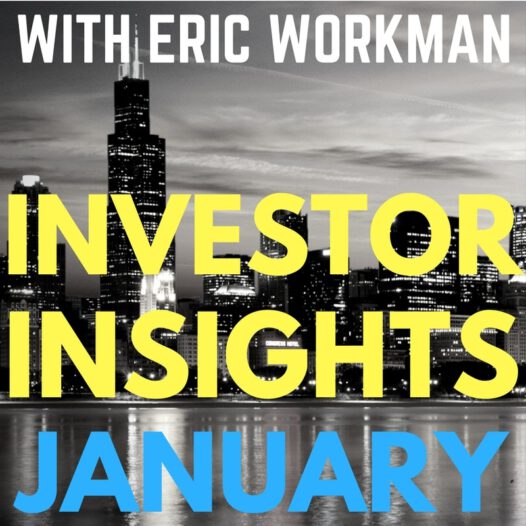Welcome to the first episode of our new monthly feature, Investor Insights!
Each month, top 1% producer Eric Workman will be providing information that real estate brokers need to know about working with investors. To kick off the series, Eric discusses how to qualify an investor before you choose to spend time assisting them. He walks you through a simple, but effective sniff test to ensure that your potential client is a good fit for your business.
Please let us know which investment topics you would like covered in future episodes!
Eric Workman can be reached at 630-408-5582 and eric@renovofinancial.com.
Transcript
D.J. Paris 0:00
This episode of Keeping it real is brought to you by Lenovo financial Renaud Vo is Chicago’s leading private lender focusing exclusively on the financing needs of real estate investors in new construction home builders. Recently renewable was rated by cranes as the second fastest growing company in all of Chicago, having provided over 350 million in financing and bringing a half billion of market value change to Chicagoland. We’re novos growth is fueled by an intense focus on customer service, and aggressively creating customized lending solutions for each investor, your goals are their commitment, Learn more at renouveau financial.com.
Welcome everybody, we’re very excited because this is a new feature that we’re having on the podcast where we’re going to be doing a monthly conversation around real estate investing. So it’s sort of a what brokers need to know about real estate investments are working with investors, how to satisfy the needs of your client, how to learn more about that, that niche yourself how to, first of all, how to figure out what niche you want to specialize in, and real estate investing really everything you need to know, so that you can add that to your business if you aren’t currently working with investors or more or yourself doing investments. And to for the show here, and for these episodes, we have Eric Workman, you may remember Eric, we did a podcast interview with him specifically, some time ago. And we had such a great conversation, we said, well, we should do this more often. And an Eric actually was very proactive in wanting to give this information. So Eric, we’re so thrilled to have you on a regular series here.
Eric Workman 1:55
Oh, awesome. I’m very excited to be a part of it and looking forward to sharing whatever knowledge and information we can with, with all the listeners out there.
D.J. Paris 2:05
Well, let’s talk about you and sort of, you know, why, why we thought you would be such a great fit. The amount of experience Eric has is really pretty incredible. Can you tell us tell us real abbreviated version of your your story?
Eric Workman 2:19
Sure. So I’ve been focused, I’ve been focused on real estate for my entire professional career. And when I graduated from college, I went right into new construction. And then like we talked about, in the episode that we taped about a month ago, I transitioned into investment, real estate, when the market crashed, you know, I kind of had to find a way to reinvent myself and to, you know, feed the family that we had started. So since 2000, in really since the end of 2008, beginning of 2009 the number of buy and hold and fix and flip transactions that I’ve personally been a part of has been in excess of, of at least 2000. I also am an investor myself, I have a have a portfolio of properties that I buy and hold and and now with my role with Renova. We finance real estate investors we have currently over 500 different projects throughout Chicagoland we’re the financing partner on so actively involved with real estate investors and in the investment space in Chicago.
D.J. Paris 3:26
I should add, Eric is the head of marketing and strategic partnerships for renouveau. Financial. So we are very, very honored to have him and his expertise on the show. So so let’s get started. Eric, tell us I know, one of the first things we were talking about discussing on the show was sort of creating a sniff test for brokers, when an investor or in group of investors maybe approach a broker sort of figuring out what to do. And the first step is is you are tying you call it like your sniff test can talk a little bit about some suggestions you have.
Eric Workman 4:03
Absolutely, you know, I really kind of even pivoted from some of the first things that we were thinking about talking about after listening to the last episode there with Lumi whenever she was talking about how so frequently she picks up clients because, you know, investors will will talk to her and will, they will, they’ll go in, they’ll end up going with her because the broker that they’re working with is just sending them properties that they either don’t want, doesn’t fit for their model can’t fit. It doesn’t work as a rental won’t work as a flip at cetera. And really kind of wanted to turn that whole thing around that when you’re a broker. You know, one of the things you have to remember is that you’re you’re a professional in the relationship to write you’ve, you know, this is this is your life. This is your business, and the people that you choose to spend your time on and that you choose to invest your time with. Need to be worth it? Right? It needs to be valuable. I’m sure a lot of people listening right now have had a number of stories of driving people around over the weekends, etc. And, you know, buyers end up, you know, kind of not ever being anything. Well, an easy way to siphon, quote unquote investors out from the very beginning is that when someone approaches you and says, Hey, I’m, I’m a real estate investor, or I want to get into investing in properties, the first question that you should ask them is awesome, will you share your business plan with me? Because I can tell you from both personal experience, and then now with, with working with so many investors on the financing side, that if you’re a professional real estate investor, you have a business plan, you have a set number of properties that you need to acquire and, and transact in a, on an annual basis, you have a style of property that you’re focused on, you have areas that you’re focused on, and you have a real plan for the operation that you run. So from a broker standpoint, someone approaches you or you get introduced to somebody, if they’re a professional real estate investor, they’re going to have a business plan, or they’re not I don’t think going to be worth the time of, of working with.
D.J. Paris 6:15
So this would be similar to for a color example, on the non investment, a client side, a buyer saying, Yeah, I want to buy a $500,000 home. Great, you have a pre approval letter? No, I haven’t done that. So sort of that maybe that that version of a business plan. But on the investment side,
Eric Workman 6:33
yeah. And now look, there, there are part time and full time investors, right? And when when someone when you ask someone, you know, hey, is real estate investing a part time kind of venture for you? Or is it your profession, you know, they’re gonna go one of two ways. And if they say that it’s their profession, you know, asked to sit down and see their business plan and go through it with them. Because, like Luminita, was, was telling us when, when an agent sins, an investor, potential investor, a bunch of properties that don’t work, or that won’t work. The investors mindset is that that broker doesn’t understand them and their business, and they’ve lost that broker, even probably without the communication has lost the ability to do business with that person going forward for the foreseeable future.
D.J. Paris 7:20
They’ve essentially wasted that investors time, they’ve
Eric Workman 7:23
essentially wasted that investors time right. Now, the flip side of that is there are plenty of people out there who either act like investors or who say they’re investors, who waste brokers time. And that’s the first thing that I want to make sure that people listening to this avoid, right? Don’t, don’t get yourself sucked into somebody with a great story, but with no plan. And make sure that the people that you’re working with have a plan, know kind of the whole the old adage of, you know, failure to plan is planning to fail. Don’t waste your time and your valuable resource of your knowledge and experience on someone who doesn’t have a plan for themselves.
D.J. Paris 8:03
But you know, this, this is so true. And as I’m thinking back, because in our firm, we have about 600 brokers and it’s, you know, certainly not every broker has relayed this particular example to me that you’re referencing about having their time wasted. But many dozens, and dozens over the years have said, well, I have this person who claims to be an investor, I consistently send them properties. That’s what they’re asking for. It’s even what they want. And nothing ever seems to happen. I suspect, you know, it’s the question of do you have a business plan, which might might stop that broker from continuing to speak to that investor? Because there probably isn’t a business plan?
Eric Workman 8:38
That’s right. That’s right. And look, if if it’s a trusted referral, and it’s someone who is either relatively new or just getting started, it might be worth your time to help them formulate a business plan. But if they either don’t have one, or if they aren’t willing to put one together, then, you know, be kind to yourself and be respectful of your own time. And who you’re choosing to work with.
D.J. Paris 9:02
Gotcha. So we’ve established that that is the the acid test question to at least get entry to the broker, or the brokers time is, you know, show me show me your plan. Let’s, you know, let’s discuss that. Okay. And then, once once it’s established that the person does have an adequate plan, where do you sort of go from there?
Eric Workman 9:23
Well, at that point, I think it’s really important for for the broker to understand, to really understand for themselves that, that there are really four buckets of kind of investment type that that that investor is going to fall into. And being able to ascertain relatively quickly kind of what those buckets are. And then using that as your own roadmap for the type of properties that you’re going to look for the areas that you’re going to set up, searches in, et cetera, so that you’re putting viable investment opportunities In front of this particular client, so that they can execute on him and so that you can, in turn get paid. And really the next question from that is all right now that, you know, do you sell these properties? Or do you keep these properties? You know, the investor typically is going to have one path or the other. And then you know what, you can start kind of on the sell side, if they sell these properties. Okay. Do you do cosmetic rehabs? Or do you do major renovations? You know, the cosmetic rehabs being kind of your standard paint, flooring, bathrooms, kitchens, landscaping, etc. You know, projects that can be done relatively quickly, major renovations would be, you know, popping the top on a bungalow, moving walls, opening up floor plans, you know, major mechanical replacement, room additions, etc. The the investor, traditionally you don’t see folks who who overlap and those too much.
D.J. Paris 11:07
Right, since you so if somebody says I’m open to both, maybe that goes back to the question of the business plan as well, let’s let’s really identify what you know, what you’re, you’re saying, typically, an investor will will have a definitive answer for what they like to do, once they acquire the property.
Eric Workman 11:24
That’s right. And if they’re new, or if this is this is kind of in the first handful of investments that they’ve done, steer them towards the cosmetic projects, the the amount of time that a major renovation takes dealing with the city dealing with, you know, the vast array of contractors, the inspections, the architects, the drawings, etc. Not only time but expense that you undertake with a major renovation. It’s, it’s difficult, at best to to make money off of those, especially as a new investor.
D.J. Paris 12:01
Actually, I wanted to go back, I apologize for skipping back. But I know this question is comes up. So this is back to the business plan question. Because I know brokers have relayed this to me, and it just occurred to me now, and somebody calls usually, you know, an individual and goes, Hey, I’ve got cash for an investment. You know, I’ve got two or 300,000 in cash. And that’s the extent of their business plan. That is, that’s a pretty red, pretty big red flag for you. Or you would say, is leaning towards maybe not somebody’s worth your time?
Eric Workman 12:34
Well, not necessarily, I guess it would kind of be. I mean, I would probably have a dozen more questions for that person, you know, right? How did you get a hold of me? What made you decide on real estate? What do you do for a living? You know, how, how valuable is this two or $300,000? To your life? You know, how long are you willing to have it out? What style of real estate investment? Are you looking to do? Do you want to create rental income with this? Do you want to use it? For a flip? Where do you live? Where did you grow up? What style of homes have you lived in? In the past? What type of property are you thinking? You know, all of these, all of those questions are kind of need to be answered. Because otherwise, otherwise you are a, you know, Europe, you’re a fisherman out in the ocean kind of wondering where to start, right? The beautiful thing about real estate is that we’re literally either in it or on it all the time. But the the tough part about real estate is that, you know, you go from, you know, renovating a condo all the way to you know, bulldozing a farm and building, you know, industrial facilities, and, and everything in between is real estate investment. So you really have to focus and hone in someone with that type of a call.
D.J. Paris 13:57
And those questions, you know, that you just referenced earlier drilling down into determining what the investor type is and the style and ultimately getting just more information so that you can now be determined, it’s not a waste of your time, you’re obviously not going to waste their time providing them with a list of properties that you know, are just outside of their interest. And yeah, and so, as far as as far as So, once have we have we talked enough about the different investor types,
Eric Workman 14:30
I think so, well, if we only gone down the sell side the you know, the the other option is that an investor is going to hold the property right. So when you when the investor is going to hold the property, your questions and at that point become Okay, are you You know from the capital that you have? Are you looking to buy the property and just keep the money parked in it? Or are you looking into do what is commonly known as a recycle play, where you buy a property, fix it up, and then refinance it in order to pull that that same capital back and kind of keep rolling it into other projects. And the reason why that’s important is, you know, you’re going to be looking at two, I would say distinctly different types of real estate, depending upon which avenue that the investor wants to go down.
D.J. Paris 15:28
Sure. And Do do do investors tend to be either residential focused or commercial focused? Or do they tend to overlap?
Eric Workman 15:40
Well, when you say commercial, are you are you referencing like, office buildings? And yes, okay. Yes, I would say yes. You know, sometimes commercial, you can, you can have what’s commonly referred to as commercial financing on an apartment building or a mixed use space. But really, the management of the two assets, or the two, to call to asset types are totally different. From a residential standpoint and a commercial standpoint. on the residential side, you’re the property management, you’re managing people and you’re underwriting people. On the commercial side, you’re managing businesses. And so it does tend to be a focus or a specialization for an investor one way or the other.
D.J. Paris 16:29
Gotcha. Well, I think this is actually a good place to pause, and sort of set up our next conversation, which will be will be very shortly. And I know it’s so for those of everyone who’s listening, we are going to get hyper specific in future episodes of because a lot. And by the way, if you have questions that you want Eric to answer, please let us know the easiest way to do that could do it on our Facebook page, just search for keeping it real pod, or website, which you can send us a message through as well keeping it real pod.com. But we’re going to be discussing all sorts of aspects of real estate investment, and investor relationships. And Eric, did you want to set up our next episode as far as the topic?
Eric Workman 17:17
Yeah, for sure. Once you’ve determined that someone’s worth your time, and you understand the style of investing that they want to focus on, or that they already focus on, really, the next step is understanding their finances. Because when you understand their finances, you now know how they can buy, what they can buy, and on what timeframe they can buy. And again, this all goes back to ensuring that you as a broker are optimally positioned to achieve higher volume and do more transactions, through your knowledge and through through making sure your time is spent best in the right ways. So once you know those things from a financing standpoint, again, it all boils down to the types and styles of properties that you can put in front of them, and making sure that you can get paid.
D.J. Paris 18:04
Awesome. And I know the first question I’m gonna ask on the next episode, we won’t answer it yet. But I know there’s going to be this question will come up. So we’ll set it up for next time, which is how do I find an investor? Right? So sometimes these opportunities just come your way? And oftentimes they don’t. So we will we can talk about that as well, their next episode or in the future on. And Well, Eric, thank you so much for your time, and we will see everyone in in about four weeks. We’re going to do this monthly and Eric will be back. And so thank you so much.
Eric Workman 18:35
Sounds great. Thank you
Subscribe: Apple Podcasts | Spotify | Email





